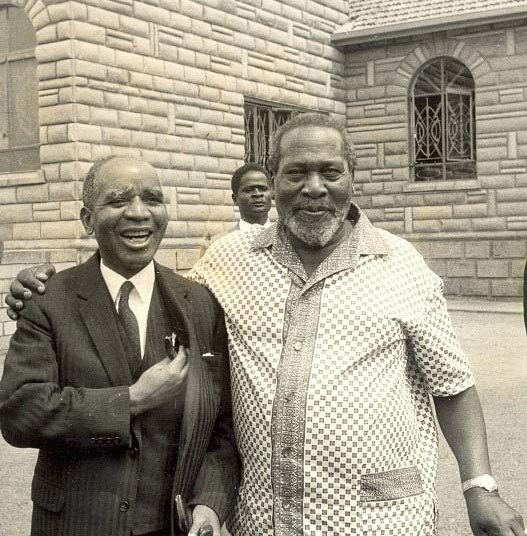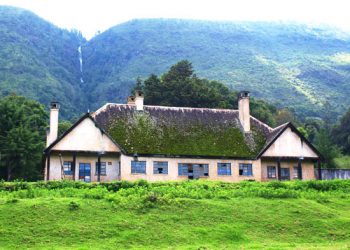Mzee Jomo Kenyatta, Kenya’s first president, personally instructed his Minister of Finance, James Gichuru to grant Sh1 million to the Kenya National Federation of Cooperatives as the seed capital to form the proposed Co-operative Bank of Kenya, its founding chairman has revealed.
Mzee Bernard Kathanga, 91, remembers that Mzee Kenyatta was enthusiastic about the proposed bank and saw it as a means to empower Kenyans who had just become independent from the British colonists.
It was in 1965 when the bank’s formation started, says Mzee Kathanga, and Mzee Kenyatta took a personal interest in its growth.
“He would call me often to get a briefing of how the bank was doing,” says the Mzee Kathanga, now a farmer in Gichugu, Kirinyaga County.
“There is this one day in 1968. He had called me, alone, to his home in Gatundu. When I arrived, we sat to chat, and he congratulated me for the good work I was doing,” says the sharp-minded founding chairman.
“Mzee Kenyatta told me; ‘I have heard of the good work you are doing at the Cooperative Bank and I want to encourage you to continue without fear. No one can sack you including the minister you are working under. I am the one who gave you this job and I am the one who can take it away’.”

This was in reference to early boardroom wars in the bank that had sucked in a minister who wanted his preferred person to chair the bank. But Mzee Kenyatta saw this as an early flag for failure if it was allowed to happen.
Although the initial idea for the bank was mooted by the Kenya National Federation of Cooperatives (KNFC), Mzee Kenyatta, on learning about the idea for a bank, instructed the then Finance Minister James Gichuru to hasten its registration and grant it an interest-free loan of Sh1 million to boost its capitalization.
“Gichuru would give us a cheque of Sh200,000 after every three months until it added to Sh1 million,” said Mzee Kathanga.
Mzee Kenyatta had nominated Mzee Kathanga to lead the bank because of his illustrious cooperative movement career that had started in 1948.
A year after he was given the responsibility to start the bank, with a team that included the late businessman and second-liberation hero Charles Rubia, he was elected to parliament.
The 1966 by-election saw Mzee Kathanga elected as an MP for Gichugu constituency. The by-election had been called because the then incumbent MP Njiru Gichoya defected from KANU to Jaramogi Oginga’s KPU.
Why Mzee Kenyatta supported the idea for a bank
Africans had started growing coffee but getting financing was a major hurdle and therefore found it challenging to expand their coffee farms or acquire modern inputs like fertilizer and machinery.
Most of the commercial banks then wanted the coffee societies to provide hefty collateral in terms of assets to advance loans but the societies had little assets.
Same case with the coffee farmers, most of whom had no assets as even land was owned by the clans. The land titling had not been done so they could not even present title deeds as collateral.
“We agreed as leaders of the co-operative societies, under the Kenya National Federation of Cooperatives (KNFC), that we should form our own bank. The idea was well-received by members, Kenyans in general, and the government was very happy and promised to support the initiative,” says Kathanga.
So, in 1965, the process of forming the bank started. A panel was constituted to pick the chairman of the bank and nine candidates were selected. The names were submitted to Mzee Jomo Kenyatta and he settled on Mzee Kathanga as the first Chairman of the Cooperative Bank.
The bank then had a modest capital base of Sh255,000, which had been collected from cooperative societies when they bought a shareholding in the new bank. Later, the government injected Sh214,000 interest-free loan repayable in 10 years.
The Banking Act, however, required banks to have a minimum capital of a ‘staggering’ Sh2 million but the government granted an exemption and offered a grace period within which the required capital was to be raised.
“The bank was eventually able to raise the minimum capital required by the Banking Act because I embarked on a campaign to popularize it in all areas that cooperative societies were being formed. In the first year, we made 40 marketing trips across the county,” said Mzee Kathanga.
After the first three years of his first term, political machinations started to be planned to ouster him by one of the cabinet ministers who had an interest in having the position taken up by one of his constituents.
“But I lobbied among then Vice President Daniel Moi, the then Secretary to the Cabinet Geoffrey Kariithi and the then Minister for Finance and Economic Planning Mwai Kibaki, who passed the matter to Mzee Kenyatta, and the following day, a letter extending my appointment was issued by the government,” he said.
How Moi nearly killed Co-operative Bank
The bank continued to register milestones under his watch, including the construction of the iconic Cooperative House along Haile Selassie Avenue.
But in late 1982, President Daniel Arap Moi, then smarting from a successful quashing of a military coup in August the same year, decided to sack the entire board of the Co-operative Bank and replace it with new faces.
“It was unconstitutional,” said Mzee Kathanga, a decision which he still protests up to date.
He reads politics in Moi’s decision in the light of the suspicions that started circulating after the coup regarding involvement of some politicians from Central Kenya in the failed coup.
He links it to the subsequent systematic strangling of Central Kenya’s economy by Moi in the years that followed. But a resilient Kathanga still managed to find his way back to Cooperative Bank as served for six years as an ordinary director, meaning he served the bank at the board level for a total of 21 years.
“The bank has not only made an extraordinary contribution to the growth of the cooperative movement in Kenya but has also assisted millions of Kenyans and helped improve the standards of living across the county,” he said.
On March 11, 2020, Co-operative Bank announced the planned acquisition of Jamii Bora Bank as part of a dominance strategy in the Kenya banking industry. The bank is third largest in Kenya with an asset base of Sh450 billion and a subsidiary in South Sudan.
editor@financialday.coke



![An Uber Eats Delivery Person [Photo/Courtesy]](https://financialday.co.ke/wp-content/uploads/2024/04/Uber-Eats-courier-tries-new-electric-boda-for-deliveries-360x180.jpeg)
![[Photo/Kenya Power And Lighting Company (KPLC)]](https://financialday.co.ke/wp-content/uploads/2024/04/KPLC-E-MOBILITY-DRIVE-360x180.jpg)

Our politicians have made our economy stagnate for their own selfish desires. Mzee Kathanga will forever be remembered as a true hero.
Truly, a selfless leader.